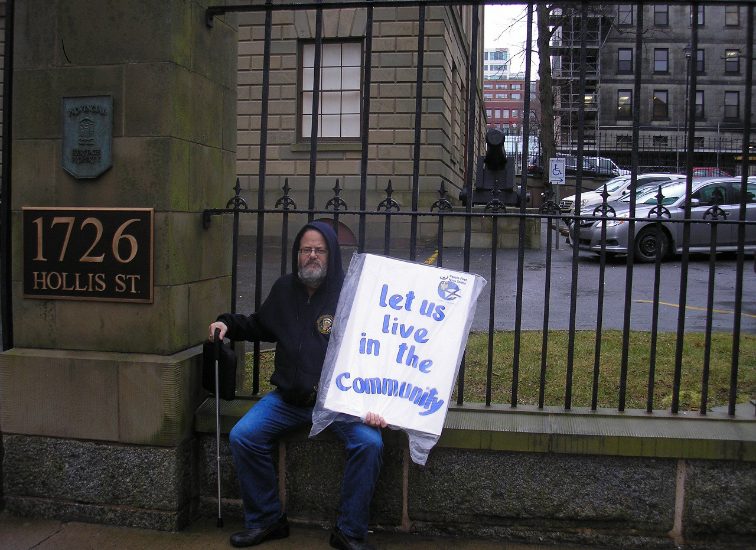
KJIPUKTUK (Halifax) – Earlier this week Nova Scotia Human Rights Board chair Walter Thompson ruled that the Nova Scotia government has indeed discriminated against Beth MacLean, Sheila Livingstone and Joey Delaney in providing “services or facilities on account of mental and physical disability,” contrary to the Nova Scotia Human Rights Act.
Thompson chaired the human rights tribunal that considered the lack of community living options for Nova Scotians with mental and physical disabilities. MacLean, Livingstone and Delaney were kept in institutions against their will and without good reason for many years.
When the news broke on Twitter I thought it was a wonderful victory. Now that I have read the decision I think it mostly sucks, but it isn’t all bad.
It’s great news for the two surviving complainants of course. I am very happy for them. Their suffering, caused by the inaction of Community Services senior management and a long list of ministers of all political stripes, was beyond words.
However, the way the decision is justified and its very narrow scope is what makes it disappointing..
Thompson mostly rejects any suggestion that what Nova Scotia is doing to all those hundreds of people who continue to wait for suitable living accommodations, either while institutionalized or simply on a wait list, is in any way systemic.
In fact, Thompson is unwilling to consider that such a thing as systemic discrimination can occur at all.
For instance, Thompson rejects the testimony by expert witness Dr. Catherine Frazee, who argued that the discrimination faced by people with disabilities is a manifestation of systemic ableism in our society.
“I must say, however, that I do not know who it is that she is talking about as being “Ableist”,” Thompson writes. ”All of the individuals who testified, including specifically the Deputy Minister, Lynn Hartwell, gave every appearance to me of the utmost respect and the most positive attitudes towards the disabled. I saw quite the reverse of any ‘systemic ableism’.”
Never mind that the absence of evil individuals is exactly what makes ableism systemic.
Along the same lines, Thompson also rejects the complainants’ argument that people with disabilities are discriminated against when compared with government’s treatment of able-bodied people.
Able-bodied people without financial means receive a shelter allowance through social assistance and can live in community, whereas people with disabilities can’t, was the complainants’ argument.
Not so, Thompson says, “in our context then, Ms MacLean, Ms Livingstone and Mr. Delaney may be said to have been discriminated against within the class of the disabled generally.”
In other words, the three were discriminated against, not because of their disabilities per se, but because other people with similar disabilities were treated comparatively better. The discrimination was random, isolated, exceptional, rather than being the rule.
There is more. You can read the decision here.
All this will make part two of the tribunal, where the tribunal considers compensation and remedies, much less substantive than it could have been had Thompson been willing to consider the systemic aspects of the discrimination.
If there even is a part two, the emphasis will likely be on reparations for the two complainants only, rather than all people who are institutionalized or on wait lists.
Livingstone died in October 2016, and the government has already committed to provide some kind of community living accommodation for both Delaney and MacLean.
That said, this week’s decision does set a precedent.
As we know, there are many others who are institutionalized against their will and without justification.
I say, if you’re institutionalized and you want to live in community, file your human rights complaint against the province now!
There’s another lesson here.
The decision reminds us that rights-based legal action can be extremely effective. But a fight in court or a tribunal room should never be the only iron in the fire.
Never abandon political pressure and direct action.
With a special thanks to our generous donors who make publication of the Nova Scotia Advocate possible.
Subscribe to the Nova Scotia Advocate weekly digest and never miss an article again. It’s free!



